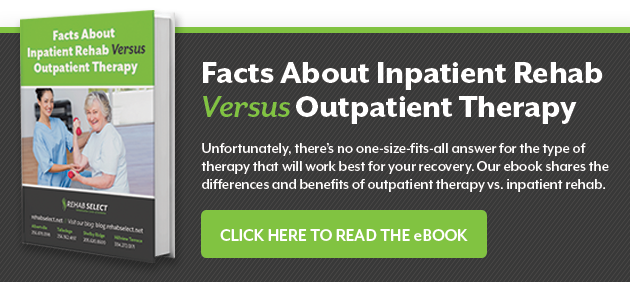
Returning to the hospital after discharge is undesirable, as it can be disruptive to your everyday life and very costly. It's unsettling when your condition doesn't get better once you go home, prompting you to go back to the hospital.
To figure out how to prevent readmission, it's helpful to understand the root cause of the issue. Usually, hospital readmission is attributable to one of five main reasons:
- Disengagement or non-compliance in treatment
- Complications with health conditions
- The inadequate transition of care
- Misinterpretation of discharge instructions
- Demographic factors (i.e., age and socioeconomic status)
Up to 30% of the cases of hospital readmission are preventable, especially with more targeted, comprehensive care. That type of care is exactly what you receive at a post-acute care center.
Post-acute care is one of the most effective ways to prevent hospital readmissions by addressing the majority of the factors that contribute to hospital readmission. Instead of facing your recovery unaided at home, you get full attentive support for your recovery from the most capable specialists with an inpatient rehab program.
The Role of Post-Acute Care in Reducing Hospital Readmissions
Post-acute care involves around-the-clock attention and rehabilitative services to help you make the most effective recovery. In an inpatient program, you and your providers are much more involved in the healing process, and you have on-site access to most of the treatment and resources you need.
Post-acute care centers reduce hospital readmissions in several ways:
Prevention
Preventable reasons for hospital readmission are common. Mistakes with medication, misinterpretations of the treatment protocol, or complications with comorbid conditions are some of the causes of avoidable readmissions that an inpatient rehab center can address.
The staff at a post-acute care center monitors your medication, prevents contraindications, and helps you get into the routine of your medication regimen. They're also able to treat coexisting medical concerns simultaneously and help you incorporate helpful treatments rather than leave you to translate them on your own.
Prevention includes not only avoiding hospital readmission but also keeping new medical problems from developing. Your medical team teaches you strategies to prevent your condition from worsening or new conditions from forming.
For example, let's say you have diabetes, and you're staying at a care center following amputation. A dietitian can help you address dietary factors that could contribute to nerve damage and heart disease so you can avoid them. If you're recovering from sepsis, your rehab specialists can help you avoid hospital readmission by identifying and managing your risk factors.
The specialists on your team show you how to take proactive measures against further complications, which leads to the next point.
Addressing complications
Many times patients return to the hospital when their condition worsens, or new concerning symptoms appear. For example, a person with COPD may, understandably, return to the hospital whenever they experience breathing difficulties.
At home, what might prompt you to return to the hospital can usually be addressed right at the care center instead. The specialists who manage your care around-the-clock address those symptoms on-site without sending you back to the hospital.
In the case of a COPD complication, your care center can provide the nebulizer treatments you need, pulmonary rehabilitation to maximize your breathing capacity, and training in preventive breathing techniques. You get better access to trained specialists, specialized equipment, and multi-disciplinary treatments at a post-acute care center than you would at a hospital. This targeted care reduces the need for readmission in many cases.
Enhancing the transition of care
The transition of care means moving a patient from one setting to another, such as from the hospital to home, in the most effective way possible. The poor transition of care is another one of the top reasons for hospital readmission.
Sending a patient home to recover on their own with casual instructions right after a major medical event isn't always the best method of transition. Without proper communication and coordination of follow-up care, patients are more likely to return to the hospital.
On the other hand, the process of going from hospital to care center to home offers one of the most effective transitions of care possible. We know follow-ups within seven days of a hospital stay significantly reduce readmission rates, so think about how much more the care from a short-term rehab facility can reduce hospitalization. This form of "follow up" is immediate and ongoing and eliminates most barriers to post-discharge care.
The collaborative efforts of the staff at inpatient care centers support your recovery efforts. The continuity and coordination of care they provide equip you for the return home.
Improving patient engagement
Patient engagement makes a significant difference in your recovery and chances for readmission. The more involved you or your caretakers are in your care, the better the outcome.
If you receive too many details, conflicting information, and complex medication schedules from the hospital, for example, you might be left feeling overwhelmed. Overwhelm can lead to avoidance and inaction, making a return to the hospital more likely. On the other hand, getting yourself and your caretakers engaged in your discharge process helps reduce avoidable readmissions.
- Active participation in treatment
- Learning about the risks and benefits of treatment
- Involvement in decision-making processes
- Taking initiative with prevention strategies
- Obtaining knowledge about their medical disposition
- Openly communicating and clarifying questions
At a post-acute care center, engagement rates are high. You have an excellent opportunity to get used to your new therapies and medication regimens, communicate with your care team, and ask plenty of questions. Your inpatient stay reinforces everything you need to know before you have to do it on your own.
Many care centers are even developing hospital readmission reduction programs in response to high readmission rates, which encourage patient input and active participation. Your participation helps you develop a clearer understanding of your condition and all that's involved in your treatment.
If you or a family member are facing hospital discharge and want to avoid readmission, use some of the valuable resources from the Agency for Healthcare Research and Quality. They provide printable guides and toolkits you can use to prepare for discharge.
Rehab Select takes active measures to improve recovery and reduce hospital readmission with a specialized inpatient post-acute care program. Learn more about these services in the Facts About Inpatient Rehab guide.





